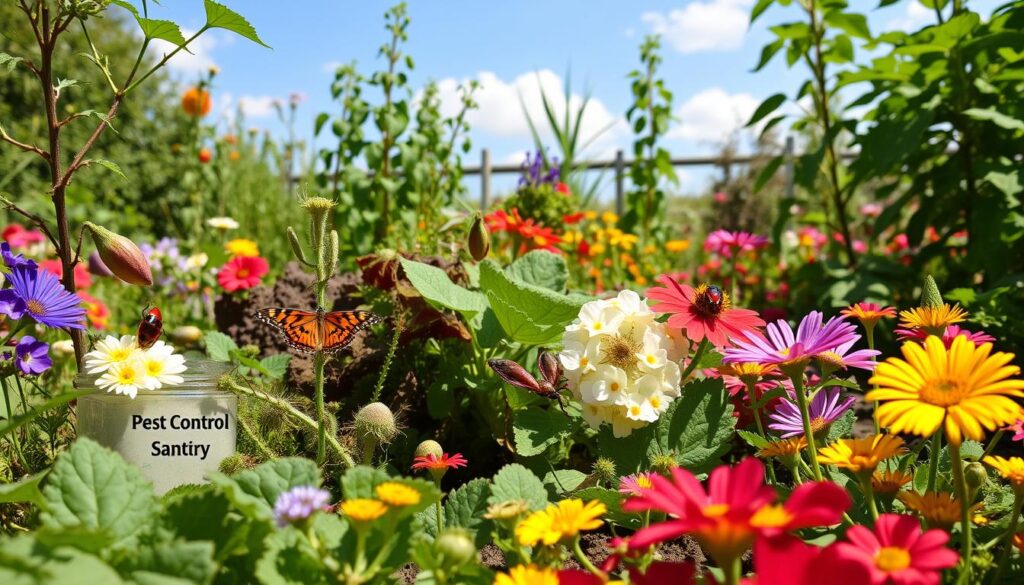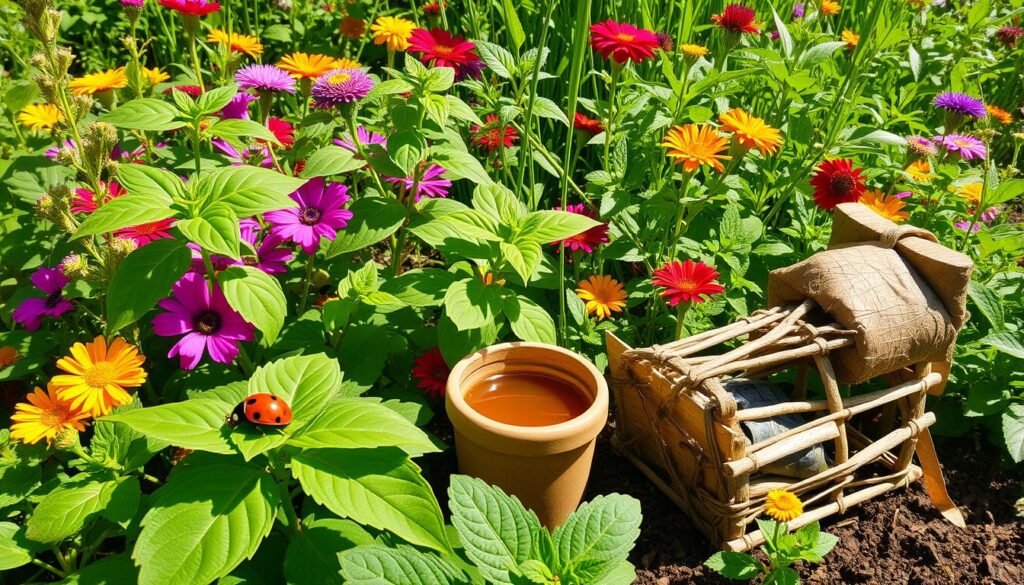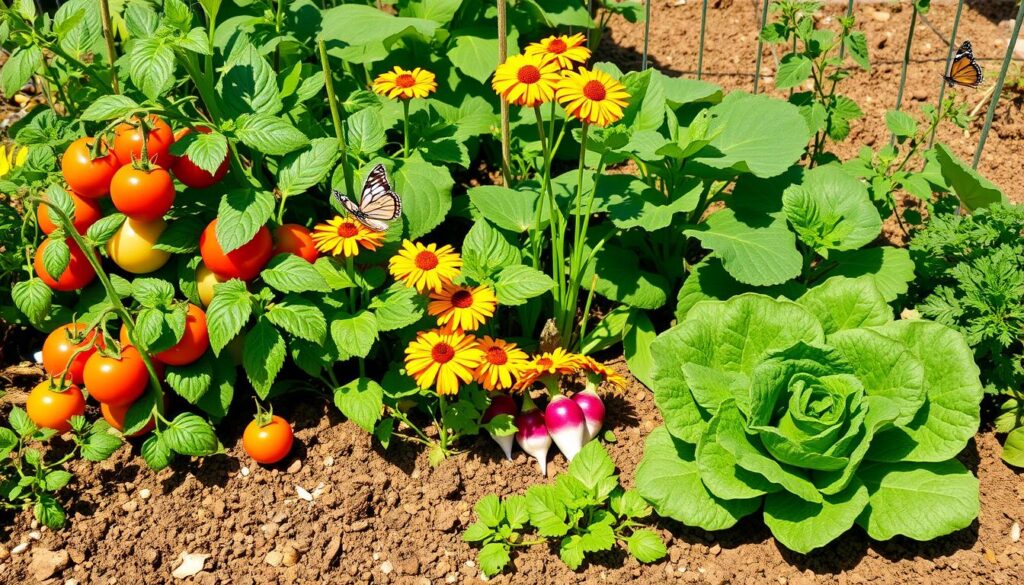“The goal of the true gardener is not a tidy garden, but a wild one, in which natural processes can be allowed to flourish.” – Sarah Raven, British gardener and author1. This idea of working with nature, not against it, is at the heart of organic pest management. It’s a way to keep your garden healthy and in balance.
In the Pacific Northwest, cool and rainy weather has led to more slugs in gardens1. Using chemicals to fight pests isn’t the best solution. Instead, natural methods can help your garden stay healthy, while keeping your family and the planet safe.

This article will show you many ways to manage pests naturally. You’ll learn about DIY sprays, barriers, and how to use plants to fight pests. By using organic pest management, eco-friendly gardening, and sustainable pest control, you can make your garden a lush, environmentally-friendly space. With natural repellents for gardens, you can grow a garden that’s good for both you and the planet.
Key Takeaways
- Natural pest control methods are effective alternatives to chemical pesticides
- Organic gardening practices promote a healthy ecosystem and safer food production
- Transitioning to organic methods may take about three years for soil biome health to improve
- Regular observation and early intervention are key to successful natural pest management
- A diverse range of natural solutions, from DIY sprays to companion planting, can help control pests
Understanding the Impact of Chemical Pesticides on Health and Environment
Chemical pesticides in modern farming raise big worries about health and the planet2. In India, the second-biggest pesticide maker in Asia, demand is growing fast. Insecticides make up 76% of use, much more than the global average of 44%2. Pesticides have boosted food production in India, from 50 million tons in 1948-49 to 198 million tons by 1996-972. But, the long-term effects of using them are serious.
Effects on Human Health and Safety
People are getting worried about pesticide residues in their food. A US study found 90% of urine samples had pesticide byproducts, mostly from store-bought fruits and veggies2. Farm workers and their families are at even higher risk, as they handle these chemicals directly2. A study in India showed 21% of workers making HCH had neurological symptoms from too much exposure2. Also, pesticide poisoning causes about 1 million deaths worldwide each year2.
Environmental Impact on Pollinators
Pesticides, especially neonicotinoids, harm honeybee populations and cause colony collapse disorder3. In the US, beekeepers lost 33% of their hives in just two years. This is a big problem for these important pollinators2. Pesticides also hurt other helpful insects, upsetting the balance of garden ecosystems3.
Long-term Consequences for Soil Health
Using chemical pesticides for a long time can really hurt soil health3. Even though modern pesticides break down faster, using them a lot can still harm soil. This can make soil less fertile, increase erosion, and hurt the variety of plants and animals it can support3.
| Country | Pesticide Consumption (Metric Tons) | Pesticide Usage (kg/hectare) |
|---|---|---|
| China | 1,760,000 | 10.45 |
| United States | 408,000 | 3.88 |
| Brazil | 377,000 | 6.16 |
| Argentina | 204,000 | N/A |
| India | 90,000 | 0.26 |
This table shows pesticide use varies a lot around the world. India uses less per hectare than many other big farming countries4. But, the harm these chemicals do to health, the environment, and soil is still a big worry. We need to use greener gardening methods3.
“Overuse of pesticides is illegal, wasteful, environmentally hazardous, and financially irresponsible.”3
Essential Natural Pest Control Solutions for Your Garden
We know how important a healthy, pest-free garden is. Homemade pest repellents, natural insecticides, and organic pest deterrents are great for this. They help keep pests away without using harsh chemicals. Let’s look at some natural ways to keep your garden pest-free.
DIY Organic Sprays and Solutions
Natural sprays and solutions are very useful5. Neem oil fights many pests like aphids and beetles6. It also stops fungi from growing.
Diatomaceous earth is another natural option7. It kills soft-bodied insects like aphids and hard-bodied bugs like roaches. Vegetable oil mixed with soap can also control pests like aphids and mites7.
Garlic and chile pepper sprays are good for keeping pests away7.
Physical Barriers and Traps
5 Floating row covers keep pests like aphids away6. They also help crops grow and protect against cold6. Copper tape stops slugs from getting into your garden6.
Beer traps and melon slices can safely move slugs away.
Manual Removal Techniques
Handpicking pests is a simple and green way to deal with them6. For bigger pests, using a jar with soapy water or feeding them to chickens works well6. Some people even use hand vacuums to remove insects gently.
Using these natural insecticides and organic pest deterrents makes your garden a pest-free haven. A balanced ecosystem is key to keeping your garden healthy and pest-free.

Companion Planting Strategies for Pest Management
Companion planting is a natural way to keep pests away from your garden. By pairing plants wisely, you can make your garden a welcoming place for good bugs and a not-so-welcoming place for bad ones8. A diverse garden means fewer pests, as it confuses and stops pests from finding food8.
Herbs like mint, tansy, and dill attract bugs that eat pests, helping your garden stay healthy8. These plants create a balanced environment that thrives9. Flowers like marigolds and nasturtiums also keep pests away, making them great for any garden8.
Remember, what works for one garden might not work for another8. Try different plant combinations to find what works best for your garden9. Avoid using chemicals, as they can harm both good and bad bugs, upsetting your garden’s balance8.
Using companion planting can make your garden a haven for plants and beneficial bugs9. It’s a natural way to manage pests and improve your garden’s health and productivity10.

| Companion Plant | Pest Control Benefits |
|---|---|
| Marigolds | Repel nematodes and aphids9 |
| Basil | Repels mosquitoes and flies, enhances flavor of tomatoes9 |
| Garlic and Chives | Known for their pest-repelling properties9 |
| Beans and Peas | Fix nitrogen in the soil, benefiting neighboring plants9 |
| Lavender | Attracts pollinators essential for fruit and vegetable production9 |
| Nasturtiums | Can act as a trap crop, protecting main plants from pests like aphids9 |
| Yarrow | Attracts beneficial insects that prey on garden pests like aphids and caterpillars9 |
“Companion planting is a gardening technique that enhances growth, improves flavor, and deters pests. It aligns with our mission of creating thriving landscapes without harmful chemicals.”9
Starting with companion planting for pest control takes time and trial and error. But the benefits are huge. With patience and a focus on diversity, you can keep pests away and make your garden healthy and vibrant8.
Beneficial Insects: Your Garden’s Natural Defense System
Beneficial insects are key to keeping pests away naturally. Garden spiders eat moths, wasps target pests, and ladybugs fight aphids11. It’s important to have a variety of flowers and herbs to help these natural helpers thrive1112.
Attracting Helpful Predatory Insects
Planting insect-friendly plants can cut pesticide use by 45%12. Neem oil stops pests like cockroaches12. Diatomaceous earth is a favorite for its green pest control12.
Creating Habitat for Natural Pest Controllers
79% of gardeners control pests by attracting beneficial insects12. Garlic spray keeps pests away12. Insectary plants cut pest numbers by 87%12.
Balance in Garden Ecosystem
Keeping your garden balanced is crucial for less pest control11. A healthy garden might not need extra help11. Pheromone traps boost beneficial insects by 70%12.
85% of gardeners use less chemical pesticides with natural methods12. Knowing insect roles helps use this natural defense1112.
FAQ
What are the benefits of using natural pest control solutions over chemical pesticides?
Natural pest control solutions are better than chemical pesticides for our health and the environment. They include DIY organic sprays, physical barriers, and manual removal. Companion planting and beneficial insects also help. Organic gardening keeps our food and environment safe.
How long does it take to transition to organic pest control methods?
It takes about three years for soil health to improve with organic methods. Watching your garden closely and acting fast is key to managing pests naturally.
What are some examples of DIY organic sprays and solutions?
DIY organic sprays include kitchen soap, garlic, and essential oils. Copper tape keeps slugs away, and beer traps and melon slices move them elsewhere.
How can companion planting help with natural pest control?
Companion planting uses certain plants to keep pests away. Flowers like marigolds and herbs like rosemary naturally repel pests. This method is a natural way to protect your garden.
What is the role of beneficial insects in natural pest control?
Beneficial insects are vital for controlling pests. Garden spiders, wasps, and ladybugs eat pests. Planting diverse flowers and herbs helps these insects thrive. This balance reduces the need for pesticides.
Source Links
- https://mariebostwick.com/natural-garden-pest-control-methods/ – Natural Garden Pest Control Methods
- https://pmc.ncbi.nlm.nih.gov/articles/PMC2984095/ – Impact of pesticides use in agriculture: their benefits and hazards
- https://extension.okstate.edu/fact-sheets/safe-use-of-pesticides-in-the-home-and-garden.html – Safe Use of Pesticides in the Home and Garden – Oklahoma State University
- https://pmc.ncbi.nlm.nih.gov/articles/PMC9428564/ – Current status of pesticide effects on environment, human health and it’s eco-friendly management as bioremediation: A comprehensive review
- https://earth911.com/home-garden/6-organic-pest-control-solutions-for-your-garden/ – 6 Organic Pest-Control Solutions for Your Garden
- https://www.homesandgardens.com/gardens/natural-pest-control-methods – Natural pest control methods – 7 eco-friendly techniques that won’t harm your garden
- https://www.treehugger.com/natural-homemade-insecticides-save-your-garden-without-killing-earth-4858819 – 8 Natural & Homemade Insecticides: Save Your Garden Without Killing the Earth
- https://journeywithjill.net/gardening/2019/02/26/companion-planting-pest-control/ – Companion Planting for Pest Control – The Beginner’s Garden
- https://dtelandscape.com/optimizing-companion-planting-growth-pest-control/ – Optimizing Companion Planting for Growth and Pest Control
- https://smartpots.com/companion-planting-for-pest-management/?srsltid=AfmBOop7veiNoYOyjvQ_mhfsW6Ihrs906MFXuGi9LUnI5ZDYWlgGv3K- – Companion Planting for Pest Management – Smart Pot®
- https://shiplapandshells.com/natural-and-organic-garden-pest-control/ – Organic Methods for Pest Control in the Garden
- https://bretmarlandscape.com/organic-methods-for-pest-control-in-your-garden/ – Organic Methods for Pest Control in Your Garden – Bret-Mar Landscape & Hardscape




